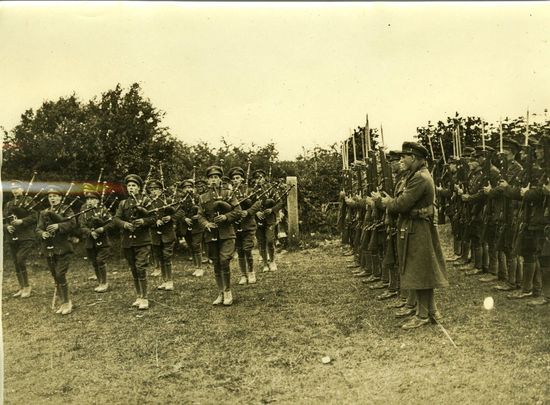Ireland's leaders have launched the 2021 program for the Decade of Centenaries to mark key events in Irish history leading up to, and including, the momentous events of 1912-1923.
The 20th Century History of Ireland Galleries will be based at the National Museum of Ireland – Decorative Arts & History at Collins Barracks in Dublin. Work on the project will start in 2021 and the new exhibition will open in 2023, coinciding with the centenary of the foundation of the Irish Free State.
These new permanent exhibition galleries will offer visitors an opportunity to reflect on significant events in Irish history over the last 120 years. The National Museum of Ireland’s vision for the project is one that will resonate with a range of audiences.
The governmental program highlights a rich diversity of ambitious, engaging, and meaningful initiatives, marking the significant centenaries arising this year and related themes, including the burning of the Custom House (May 25, 1921), Partition, the truce (July 11, 1921), the Anglo-Irish Treaty Negotiations and the Treaty debates, and the signing of the Anglo-Irish Treaty (Dec 6, 1921).
Read more
An Taoiseach, Micheál Martin said: “The aim of commemoration should be to broaden sympathies without having to abandon loyalties. We share an island where contested history can be a barrier to mutual accommodation and the reconciliation necessary to our shared future.
“History cannot be a dehumanized, reductive, simplistic, or self-serving narrative. And when we look back to a period of conflict we must be especially careful to recall that history is the complex story of individual men and women, their lives, their flaws, their strengths, their struggle, and their suffering, however, they identified, whatever uniform they wore.”
The program aims to create and support interesting and imaginative opportunities that encourage as many people as possible to consider our shared history, in all of its complexity, in a respectful and supportive environment.
The program highlights specific initiatives, partnerships, and events that are being developed and rolled out throughout 2021. It also outlines the Government’s approach to the final phase of the Decade of Centenaries leading up to 2023. It will remain a living document and will be updated as new proposals and partnerships are confirmed throughout the year.

Love Irish history? Share your favorite stories with other history buffs in the IrishCentral History Facebook group.
Minister for Tourism, Culture, Arts, Gaeltacht, Sport and Media, Catherine Martin said: “We are now in the most sensitive and complex period of commemoration, as the State marks the centenaries of the Struggle for Independence, Partition, Civil War, and the Foundation of the State. My responsibility is to ensure that these significant events in our shared history are remembered with an appropriate, meaningful, proportionate, and sensitive program, which recognizes the legitimacy of all traditions and values mutual respect and historical authenticity.
The history of this period belongs to all of us and it is really important that we approach our remembrance of these events in a holistic way – seeking to understand how each impacted upon the next. For this reason, I have taken a three-year approach to planning this final phase of the Decade of Centenaries."
Catherine Heaney, Chair of the National Museum of Ireland, said the project "will offer an important opportunity for a wider public consultation process with communities across Ireland on our contemporary history, ensuring that the exhibition is relevant and engaging to multiple audiences and identities within our communities. The NMI is committed to ongoing engagement and dialogue with the public, and particularly those voices traditionally under-represented in narratives of our recent history. The historical collections of the National Museum of Ireland number in their hundreds of thousands, and these new, permanent exhibition galleries will represent the largest ever interpretive showcase of Irish political, cultural and social history dating from the year 1900 to the present.”




Comments